Lakeman had got me wrong. The world which I inhabited was far from glamorous. The literary life is rarely the path to wealth and celebrity of which ambitious young authors eternally dream, despite all our public protestations to the ideals of art and philosophy. We write because we feel we have something to say, at least in the beginning, but beyond this romantic desire to fashion something beautiful and true out of nothing more than ink and paper lays the longing for recognition, preferably critical and popular, for what use is literature if it does not sell? It is fame we crave, do not be fooled, fame and fortune, for the other dream of the writer is to be financially secure, to be untroubled by the landlord’s agent and the bailiff, to have no other line of work to distract him, and to simply write. It is, however, far from a wise path to take, at least for those who have any other before them. Nonetheless, it is a course to which men will obsessively devote themselves, as they might to a perverse marriage, contrary to other men’s warnings, and even to their own legible experiences of a life spent entirely within a dream.
In this regard I was my father’s son. My father was a consummate dreamer, and as it was with my politics and my religion, I had also inherited his dreams. He was a child of the Romantic era, and its values never really deserted him, no matter how much they were assimilated and polluted by the world of the profit and the loss. When news of the drowning of Shelley reached England, my father wept with a passion I had not witnessed since the passing of my mother. Would that he had lived to see me walk out with Mrs. Shelley, albeit quite briefly, for I was one of many young men with stars in their eyes with whom she dallied and soon discarded. My father would have been very proud, and, I’d warrant, not a little jealous, for she was a handsome woman, a brilliant thinker, and damn fine sport, even though her heart lay with a corpse.
Father took the Examiner when he could spare the coin. He loved to read to us, my mother and me, and could recite from memory many lines by Mr. Keats, Mr. Shelley and Lord Byron (all doomed of course, although we did not know it then), just as he could long passages from his beloved gothic romances, old friends all that had sustained him throughout his lonely life. He had an equal passion for Sir Walter Scott, especially his poetry, and how my spine thrilled when blood rained from the sky in ‘Lord Ronald’s Coronach,’ and during the punishment of Constance in Marmion (a mad poem published the year I was born). Entombed alive within convent walls, her wailing torment compelled her executioners to order the chapel bells tolled to drown out the horrific screams. This terrible lament caused the hair of the most powerful highland creatures to stand on end, as it did my own every time my father spoke the lines, as ever doing so from memory.[3] I did not so much share his enthusiasm for Mr. Wordsworth, but was stunned by the fancies of Mr. Coleridge. I still carried my father’s copy of Lyrical Ballads about me on the Birkenhead, a first edition I had managed to save from the bailiffs. When I later met the Ancient Mariner himself, at the Fraser’s Magazine inaugural banquet, it was as much as I could do to refrain from falling at his feet and proclaiming my unworthiness to be in his presence, the irony being that the poor old soul was so out of his mind by that point that he would have neither known nor cared.
I spent my early years in a small cottage that seemed built of books, and I took to the printed word so fast that it seemed I was remembering rather than reading. Thus was my education conducted, for there was no formal provision in those days; much as it is now, it would seem that our masters prefer to keep the laboring classes ignorant as well as poor. There cannot have been as many books as my memory has embroidered, for my parents were never that prosperous, even in the best of times. But, as my mother would say in the lean months, when my father despaired of raising a child in poverty and his voice travelled further than he intended, it was love and common sense that raised decent children, not money.
Our private library was, like me, the result of the coming together of my mother and my father. Both were inveterate bookworms, although she came from the better family, so more shelf space originally belonged to her than to him. His collection was mostly the result of diligent purchasing at fire auctions in town. He was an autodidactic master of restoration, and could stitch and rebind damaged pages in beautiful hand fashioned leather covers. He was a tailor by trade, but I think he would have loved to have been a bookbinder’s apprentice. As it was, he sewed paper as much as he did cloth. The books were always the last things to go when it was time to visit the pawnbroker’s shop in town, and I soon came to understand that to my father the significance of these volumes went far beyond the wit and wisdom contained therein. For my father these poems, tales, histories, dissenting tracts, and philosophical treatises represented an intellectual and emotional freedom that it was not his lot in life to achieve in the physical world. Further to this meaning, it was also his constant, yearning hope that these books were the path by which his only child would ascend to some sort of respectable and secure profession, perhaps in education, or even the law. He imagined me a schoolmaster or an articled clerk, while all the time filling my head with tales of mad monks, animated skeletons, and the shades of bleeding nuns.
It was my father’s literacy that had attracted Sarah, my mother. Her father had done business with him, and she had been quite taken with his soft, well-spoken and slightly old fashioned manners. She could see he had a disenchanted soul, yet felt sure she detected a warm hearted and fine man under that nervous countenance and made it her mission to have him for her own. This was much to the chagrin of her family, who were of the mercantile class and, although far from rich, believed themselves to be considerably better heeled than the object of her affections, although at this point in the proceedings he knew not that she was, as he later used to joke when he told me the story, ‘trying to hook him.’ She countered that he was an honest, God-fearing and hardworking man, with his own shop and therefore prospects. She was also keenly aware that her father would not live forever, and she had no means of survival without him save relying on her brother. Moreover, she did so desperately desire a family of her own. At more years past thirty than she cared to admit, she was fast running out of time.
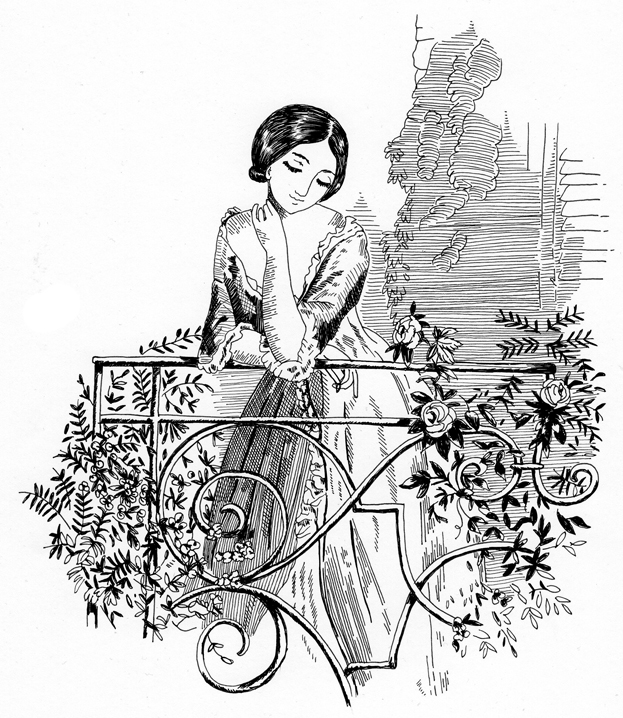 It was always, on the face of it, an unlikely match. She had been a beautiful, if delicate, flower of the fields in her day, but she was no longer young, and this was a factor in my father’s favour in the eyes of her own. Her brother, however, opposed the match to the end, being particularly appalled that my father was several years my mother’s junior. My father was also useless around women. Although he was a good looking specimen in his own way, tall, with thick black hair and vivid blue eyes (both features I have inherited), he was bookish, introspective and painfully shy around the opposite sex. His parents were long dead and he had no surviving siblings, and although distantly polite in public he much preferred his own society to that of his neighbours, so was in consequence completely lacking in the social abilities prerequisite in the ritual of courtship.
It was always, on the face of it, an unlikely match. She had been a beautiful, if delicate, flower of the fields in her day, but she was no longer young, and this was a factor in my father’s favour in the eyes of her own. Her brother, however, opposed the match to the end, being particularly appalled that my father was several years my mother’s junior. My father was also useless around women. Although he was a good looking specimen in his own way, tall, with thick black hair and vivid blue eyes (both features I have inherited), he was bookish, introspective and painfully shy around the opposite sex. His parents were long dead and he had no surviving siblings, and although distantly polite in public he much preferred his own society to that of his neighbours, so was in consequence completely lacking in the social abilities prerequisite in the ritual of courtship.
‘You always think of such things at other folks’ weddings,’ my mother used to say. Everyone in the small market town turned out for such events, and when George Leggett wed Daisy Holmes in the spring, my mother made her move. She was helping the other women with the outdoor party after, and made sure it was always her that served my father. He nervously accepted brimming plates of bacon and greens, bread, cheese and cake from this equally brimming beauty, while the other men at his long table grinned and winked and muttered, with Samuel McGuire, the butcher, whose capacity for the drink was a mystery to medical science, asking in the most audible whisper how it was that my father’s mug was always filled first and fullest, and always by the same girl. My father made a big thing of cleaning, filling and lighting his pipe, and then drank his beer deliberately to hide his embarrassment. This did not help him, for he was not by nature a drinking man and every time he drained his pint, my mother appeared as if summonsed by ring or lamp and filled it again.
‘So how is it you never married, Joseph?’ McGuire was asking, ‘a big fine fellow like yourself.’
‘Too busy,’ my father mumbled, ‘the shop—’
‘And sure what use is a big old shop with no one to keep you warm in the winter?’ said the butcher, who was secretly of the old faith and had a plump wife and ten children, ‘Just wet the bottom of the glass girl,’ he said then, for my mother was back again. ‘And with all these grass widdys, staid damsels and young and blooming maidens in the world,’ he continued, looking slyly up at my mother to signal in which category she was placed and draining his tankard. She bent to top him off again from a big stoneware jug, and McGuire gave her a boozy wink. ‘More’s the shame and pity,’ he went on, ‘that a fine big man like this, with the ball at his foot so to speak, don’t just give it a kick and send it straight into the chapel.’ He appealed to the surrounding company, half of which were in suits made by my father and were taking immense delight in his discomfiture. ‘Now why is that do you think?’ He looked my father in the eye interrogatively.
My father became acutely aware that my mother was also watching him. He took in her fine figure, agreeably presented in her best frock, and finally met her steady grey-eyed gaze.
‘I never, I mean I didn’t really, I suppose—’
‘Spit it out man,’ said McGuire, and he laughed.
‘I never met the right girl,’ my father finally confessed, looking for all the world as if he had been caught stealing apples from the tree in the vicar’s garden. My mother just smiled, and waltzed away to attend to her father’s glass (he was the guest of honour), of which she had been uncharacteristically neglectful.
She sang ‘The Knight and the Shepherd’s Daughter’ that evening, in the candlelight after the new Mr. and Mrs. Leggett had slipped away. My father’s eyes never left my mother’s after that, not until the night he killed her.
It was a laborious courtship though, observed with great amusement by my father’s customers, while their wives secretly lamented that they had never been wooed with such delicacy. My mother was satisfied that my father’s intensions were amorous, and so she waited upon his proposal. Usually a patient woman, she finally convinced her father to invite his tailor to the front door for once, and after an awkward Sunday dinner at which her brother glowered silently throughout every course, she bade my father stay a while and take the air in the garden. They were married in the autumn, the year the French occupied Portugal, with Sam McGuire sagely remarking that, ‘The pitcher which goeth often to the well getteth broken at last.’
My grandfather would not see his daughter live above a shop, and purchased a modest cottage for her on the outskirts of town from a local farmer. He died quite suddenly soon after, finally joining his wife, who had been taken giving birth to his only son twenty-odd years since. My parents were fortunate to have been given the cottage, for he left his daughter not a penny. Her brother sold the family home and business and left for London. After the funeral he exchanged not a word more with his sister. Although my mother was not young, or in the best of health, truth be told, love and life found their way, and I was born the following year. It was a difficult birth, and my mother knew she’d not have another. By common agreement I was named in honour of her father, James.
The reclusive Joseph had not expected to become either husband or father, but he took to his new role as if he had been made and was waiting all along just for us. He thanked the Lord every day for granting him a son, and spent as much time with me as his work would allow; reading, playing and teaching me everything he could. Our Sunday trips to the river to fish were as sacred to me as the morning service. I adored my father, and much to the amusement of my mother I would follow him around like a puppy, and he always had time to stop and ask after the nature of my day, regardless of how busy his own. Best of all he would promise, and always deliver, a story before bed. My mother he taught to sew, and together they ran a modest business. The work was hard, and there was never much money, but my father watched his small family flourish with pleasure and pride. Despite his characteristic sense of caution, he had no idea how precariously balanced was this new found happiness. You never do, do you?
Click here to read Chapter V

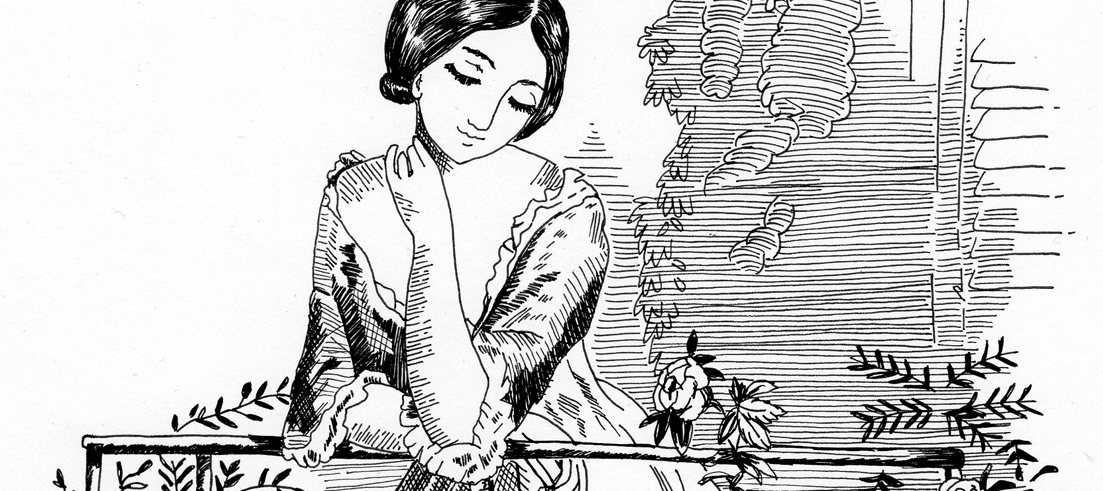
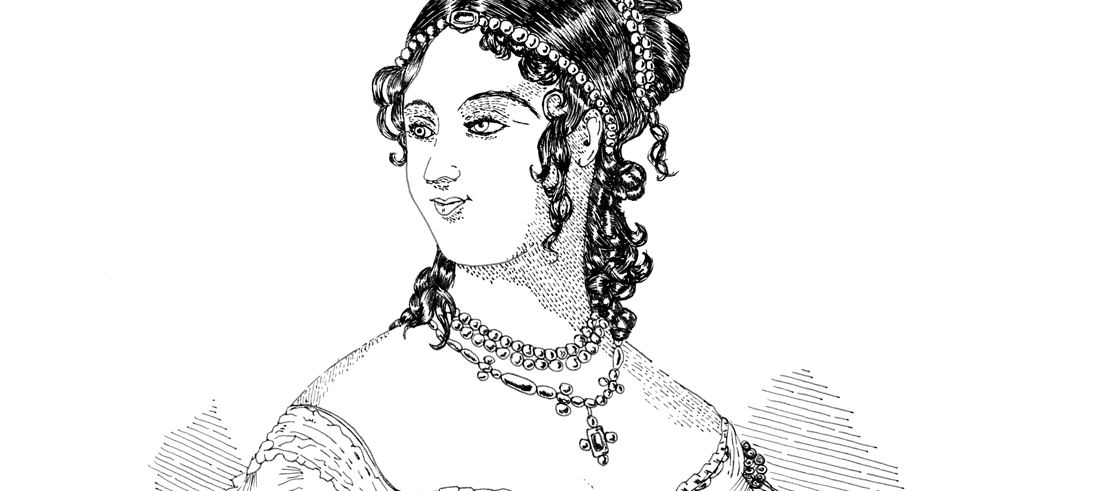
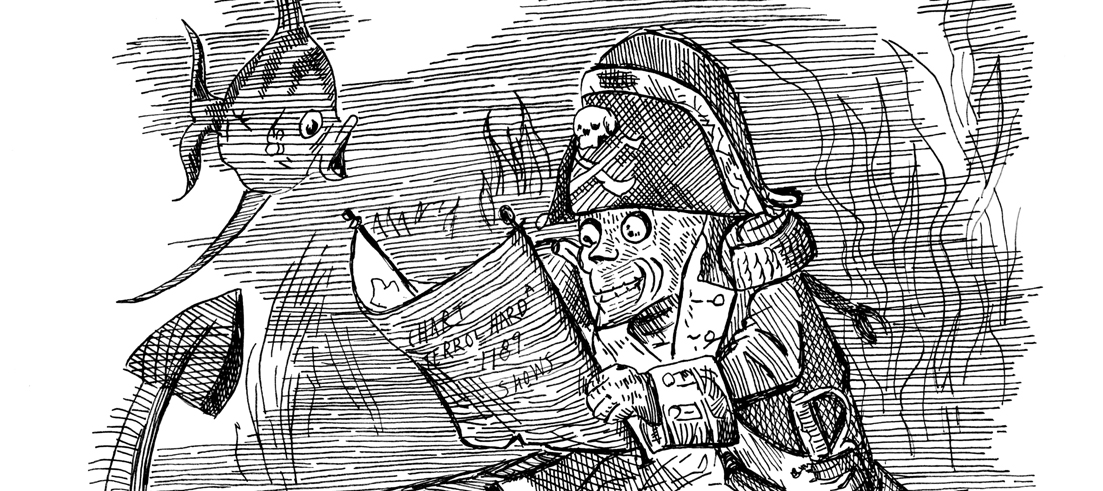
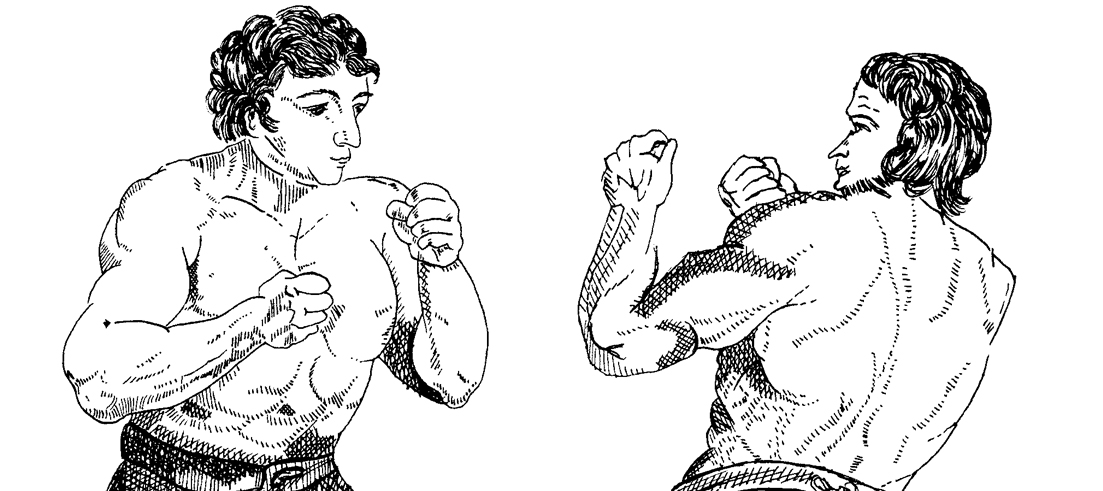
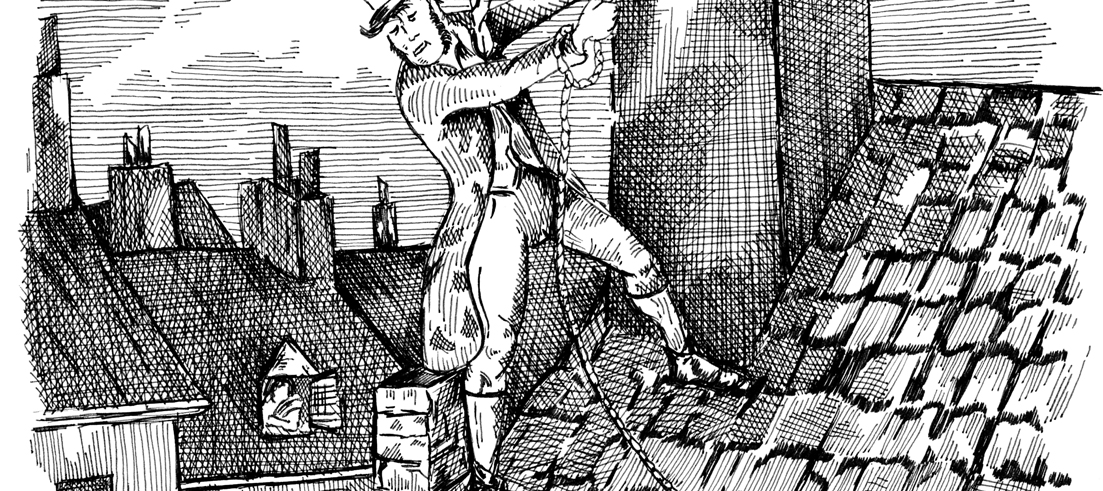
Pingback: Shark Alley – Ainsworth and Friends